Posts Tagged ‘Danish PEN’
PEN Journey 40: The Role of PEN in the Contemporary World
PEN International celebrates its Centenary in 2021. I’ve been active in PEN for more than 30 years in various positions and now as an International Vice President Emeritus. With memories stirring and file drawers of documents and correspondence bulging, I am a bit of a walking archive and have been asked by PEN International to write down memories. I hope this personal PEN journey will be of interest.
At the end of September 2005 a Danish newspaper published 12 editorial cartoons which depicted Mohammed in various poses as part of a debate over criticism of Islam and self-censorship. Muslim groups in Denmark objected, and by early 2006 protests, violent demonstrations and even riots erupted in Muslim areas around the world. The offense was the “blasphemy” of drawing Mohammed in the first place and the particular mockery of some of the depictions in the cartoons.
The uproar over the Jyllands-Posten Mohammed cartoons quickly drew PEN into the controversy, first through Danish PEN and then through the International PEN office and other PEN Centers. PEN included many Muslim members and numbers of centers in majority Muslim countries. All PEN members and centers endorse the ideals stated in the PEN Charter. However, the third and fourth articles of the Charter which addressed the situation, also at times appeared to contradict each other:
Article 3: “Members of PEN should at all times use what influence they have in favour of good understanding and mutual respect between nations and people; they pledge themselves to do their utmost to dispel all hatreds and to champion the ideal of one humanity living in peace and equality in one world.”
Article 4: “PEN stands for the principle of unhampered transmission of thought within each nation and between all nations, and members pledge themselves to oppose any form of suppression of freedom of expression in the country and community to which they belong as well as throughout the world wherever this is possible. PEN declares for a free press and opposes arbitrary censorship in time of peace. It believes that the necessary advance of the world toward a more highly organized political and economic order renders a free criticism of governments, administrations and institutions imperative. And since freedom implies voluntary restrain, members pledge themselves to oppose such evils of a free press as mendacious publication, deliberate falsehood and distortion of facts for political and personal ends.”
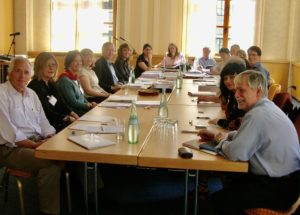
PEN International Board and Staff 2006. L to R: Eric Lax (PEN USA West), Elizabeth Nordgren (Finish PEN), Jane Spender (Programs Director) Sara Whyatt (Writers in Prison Committee Director), Eugene Schoulgin (Norweigan PEN), Caroline McCormick Whitaker (Executive Director), Karen Efford (Programs Officer), Joanne Leedom-Ackerman (International Secretary), Jiří Gruša (International President), Judith Rodriguez (Melbourne PEN), Britta Junge-Pederson (Treasurer), Judith Buckrich (Women Writers Committee Chair), Chip Rolley (Search Committee Chair), Sylvestre Clancier (French PEN), Sibila Petlevski (Croatian PEN), Peter Firkin (Centers Coordinator) [not pictured: Mohammed Magani (Algerian PEN), Karin Clark (WiPC Chair), Kata Kulavkova ( Translation and Linguistic Rights Chair)
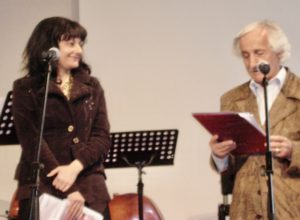
Peace Committee program 2006. Sibila Petlevski (Croatian PEN), Veno Taufer (Peace Committee Chair)
At the Peace Committee conference that April, I observed, “The Charter of PEN asserts values that can appear contradictory, but represent the dialectic upon which free societies operate and tolerate competing ideas…In our 85th year, International PEN still represents that longing for a world in which people communicate and respect differences, share culture and literature, and battle ideas but not each other.”
The Danish cartoon controversy led off 2006. For me, the PEN year also included attending the conferences of three of PEN’s four standing committees—the Peace Committee in Bled, Slovenia, Writers in Prison Committee in Istanbul, Turkey (PEN Journey 35) and Translation and Linguistic Rights Committee in Ohrid, Macedonia (PEN Journey 39)—and in May the 72nd PEN World Congress in Berlin, and later a Danish Conference on the Middle East in Copenhagen, the Gothenburg Book Fair in Sweden, a PAN Africa Conference in Dakar, Senegal and a trip to Moscow, where I went to watch my oldest son compete in the European Wrestling Championships and visited Russian PEN on a mission.
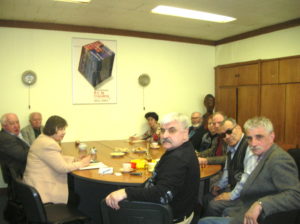
Russian PEN members meeting in Russian PEN office, including Alexander Tkachenko, General Secretary, 2006
To Moscow I took just under $10,000 raised by PEN centers and buried in my luggage to help the Russian PEN Center. Vladimir Putin and the Russian government had begun to crackdown on nongovernmental organizations with ties to other countries. One of their first targets was Russian PEN which had opposed the legislation restricting nongovernmental organizations. At the time I was also on the board of Human Rights Watch, a larger organization which was watching closely what was happening to PEN. The government’s attack on Russian PEN came in the form of a freeze on all assets for failure to pay a land tax. Russian PEN argued that it was a legal tenant where it had been conducting business and was not liable for the tax on the land, but the tax office refused to drop the charges. The government threatened to close PEN and take away its office if the money wasn’t paid. An appeal had gone out to PEN’s other centers, which had responded from around the globe not only with protests to Moscow but also with funds for Russian PEN.
I brought in funds just under the amount I would have had to declare. During the wrestling tournament I met with Alexander (Sascha) Tkachenko, the General Secretary of Russian PEN, and delivered to him the donation, and he gave me a receipt. The funds stayed off the crisis for then. Charges were dropped. A Russian Minister said, “I don’t understand. I was getting letters from as far away as Argentina!” Sascha answered him: “That is the kind of organization we are.” PEN continued to operate.
In Moscow I also met with Russian PEN members as well as with Turkmen author Rakhim Esenov, who was visiting Russian PEN. I had met Esenov a few weeks before in New York where he had won PEN America’s Barbara Goldsmith Freedom to Write award. In Turkmenistan Esenov had been charged with “inciting social, national and religious hatred using the mass media” because of characters in his novel The Crowned Wanderer. Set in the 16th century Mogul Empire, the story focused on a poet/philosopher/army general who was said to have saved Turkmenistan from fragmentation. The president of Turkmenistan Saparmurad Niyazov banned the book for portraying the main character as a Shia rather than a Sunni Muslim, and he imprisoned Esenov for several months. I still have the massive Russian language volume he shared with me, a work that had taken him years to write.
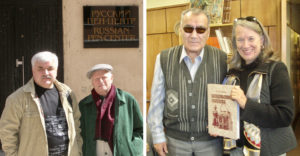
L to R: Russian PEN General Secretary Alexander (Sascha) Tkachenko and Russian PEN member outside Russian PEN office in Moscow and Rakhim Esenov, author of The Crowned Wander and Joanne Leedom-Ackerman (PEN International Secretary), 2006
At the Peace Committee conference earlier that month I’d presented a paper on the conference theme “The Role of PEN in the Contemporary World,” a broad and challenging topic which had inspired me to peer both backward and forward.
Below is the beginning of that paper with a link to the rest:
My first memory of a PEN meeting was sitting in someone’s living room in Los Angles writing postcards to free Wei Jingsheng from prison in China. At the time in the 1980’s he’d already been in prison several years of a fifteen-year sentence. I had no idea who this writer was thousands of miles away. I barely knew the other writers in that living room. On the coffee table would have been PEN’s Case List, which at the time was white sheets of paper stapled together.
We wrote and stamped our post cards for Wei and other writers that afternoon. I’m sure we were provided with background on his case. I pictured these cards fluttering into a jail somewhere in China and perhaps even into the cell of this stranger to let him know we had taken note of him and cared what happened. Looking back on the blue-sky afternoon as we sipped sodas and ate crackers and cheese, I see our act as a bit fleeting, an effort to imagine the fate of another writer who didn’t have our freedom to write and speak…[continue reading here]
Next Installment: PEN Journey 41: Berlin—Writing in a World Without Peace
PEN Journey 17: Gathering in Helsingør
PEN International celebrates its Centenary in 2021. I’ve been active in PEN for more than 30 years in various positions and now as an International Vice President Emeritus. With memories stirring and file drawers of documents and correspondence bulging, I am a bit of a walking archive and have been asked by PEN International to write down memories. I hope this personal PEN journey will be of interest.
What I remember most about the gathering of colleagues from 28 countries—31 PEN centers—51 of us in all at the first Writers in Prison Committee conference in 1996 was the seriousness of purpose and intellect during the day and the fun and talent in the evenings.
Hosted by Danish PEN, writers from every continent gathered at a university in Helsingør—known in English as Elsinore, the home of Shakespeare’s Hamlet—where we met in workshops and ensemble during the day to shape and refine our work on behalf of writers and freedom of expression around the world. But in the evening we were at a small university in a small city without transportation or distraction so we entertained ourselves. Each delegate displayed talents—from poetry reading to song to dance to musical performances.
As Chair of the WiPC gathering, I’d brought none of my own writing to read and was left to exhibit meager other talent which consisted of playing a few opening bars of Für Elise on the piano and whistling tunes with my far more talented Danish and Russian colleagues. Archana Singh Karki from Nepal in flowing red dress entertained with her graceful dance; Siobhan Dowd, our Irish former WiPC director and Freedom of Expression director at American PEN, silenced us with her soulful Irish folk songs, sung acapella; Sascha, Russian PEN’s General Secretary, not only whistled robustly but recited his poetry, which I was told I should be glad I didn’t understand with its bawdy content; Sam Mbure from Kenya and Turkish/English novelist Moris Farhi also read and recited work. PEN International President Ronald Harwood joined the discussions in the day and was audience in the evening. I don’t recall if Ronnie offered his own work, but we all bonded in our mission and in our support for the talent in the room.
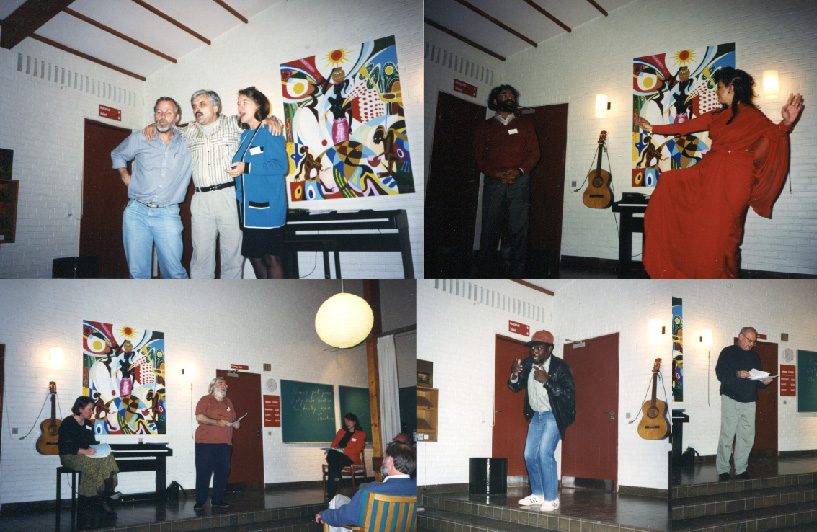
Entertainment in the evening: From the top left—Jens Lohman (Danish PEN), Alexander (Sascha) Tkachenko (Russian PEN), Joanne Leedom-Ackerman (Chair of WiPC)in a whistling song; Rajvinder Singh (German PEN, East) accompanying Archana Singh Karki (Nepal PEN) in dance; Siobhan Dowd (at piano—English & American PEN) with Moris Farhi (reading—English PEN); Sam Mbure (reciting—Kenyan PEN); Niels Barfoed (reading—Danish PEN)
During the three days, we fine-tuned our methods of working on and campaigning for our main cases, those writers who were imprisoned, attacked or threatened because of their writing, often their nonviolent voice of protest against authoritarian regimes. We considered PEN’s decision-making on borderline cases such as those which included drug charges, advocacy of violence, pornography, hate speech, terrorism. These were not categories we normally took on as cases. We discussed when we might take up such a case or assign them to investigation or judicial concern. We laid the groundwork for more joint actions among centers and other organizations such as the U.N., OSCE and IFEX, the International Freedom of Expression Exchange.

Round Table of the WiPC conference which included delegates from PEN centers in Switzerland, Jerusalem, Denmark, England, Mexico, Portugal, America, Norway, Czech Republic, Ghana, Canada, Australia (Melbourne and Sydney), Portugal, Finland, Nepal, Scotland, Malawi, Kenya, Ghana, Croatia, Slovakia, Sweden, Spain, Austria, Japan, Germany, Russia, Poland, Netherlands
With PEN’s WiPC staff Sara Whyatt and Mandy Garner, we set out a campaign calendar for the year, beginning with Turkey in May; China in June; Myanmar in July; Guatemala in September; Vietnam in October; Nigeria in November; Human Rights Day focus in December; Cuba in January; Rushdie and Fatwa and Iran in February; United Nations Commission on Human Rights lobbying in February/March and a return to China during the Chinese New Year in February/March; International Women’s Day in March and World Press Freedom Day in May. This campaign calendar meant that the London office would send information each month related to these foci, and PEN centers would plan programs if the campaign fit their work and the cases they had taken on.
We discussed the elements of successful missions to troubled areas and what future missions should be considered. In 1997 PEN International and Danish PEN sent representatives on a quiet mission to Cuba. We also strategized on the effect of writers observing trials in certain countries, particularly in Turkey.
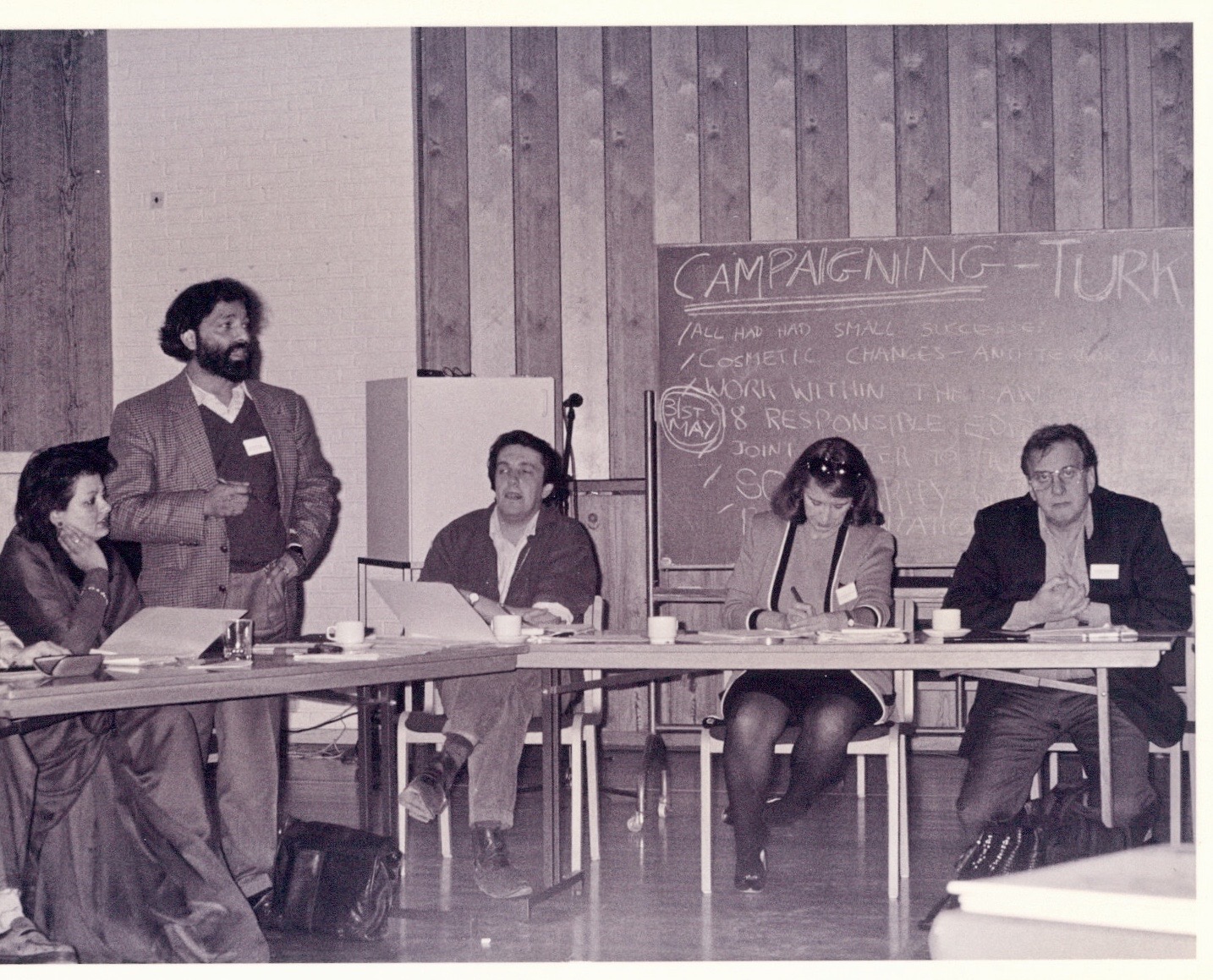
Working session on Turkey Campaign at at WiPC conference: L to R: Archana Singh Karki (Nepal PEN), Rajvinder Singh (German PEN, East), Robin Jones (WIPC staff), Joanne Leedom-Ackerman (WiPC Chair), Ronald Harwood (PEN International President)
During the conference a request came for members of PEN to sign on individually and en mass as publishers of a book in Turkey which republished an article by the famed Turkish novelist Yaşar Kemal, along with articles by other Turkish writers who were in prison because of their writing. Kemal had recently been charged because of an article he’d published in the German magazine Der Spiegel about the Kurds. The organizer in Turkey had gathered hundreds of Turkish writers, publishers, artists, and actors to sign on as publishers. They wanted to present the book and the list of hundreds of publishers to challenge the courts to bring charges against everyone. Many of us agreed to participate. This act launched a campaign in Turkey and a mission later in 1997. (Blog to come.) The independent Turkish Freedom of Expression Initiative has since gathered biennially for the last 23 years. For this kind of joint action PEN was primed to cooperate.
Finally in Helsingør the Writers in Prison Committee took a step towards opening up the election process for the WiPC Chair. My term was due to expire at the fall 1996 Congress in Guadalajara. We decided to select a nominating committee from members to find candidate(s) for the next chair rather than have the post appointed by the Secretariat in London. That process was later replicated in other elections in PEN and is standard procedure today.

Workshop: From left includes: Neils Barfoed (Danish PEN), Lady Diamond (Ghana PEN), Moris Farhi (English PEN), Sara Whyatt (WiPC Programme Director), Mandy Garner (WiPC researcher), Joanne Leedom-Ackerman (WiPC Chair at front)
Helsingør was a fitting venue for the first WiPC Conference, not only because of its literary credentials with the Kronborg Castle where most of Shakespeare’s Hamlet takes place, but also because of its historic legacy in World War II. Helsingør was one of the most important transport points for the rescue of Denmark’s Jews. A few days before Hitler had ordered that the Danish Jews were to be arrested and deported to concentration camps October 2, 1943, one of the Nazi diplomatic attaches who’d received word in advance shared the information with the Jewish community leaders. Using the name Elsinore Sewing Club, the Jewish leaders communicated with the population, and the Danes moved the Jews away from Copenhagen to Helsingør, just two miles across the straights to neutral Sweden. The Danish citizens hid their fellow Jewish citizens until they could get onto fishing boats, pleasure boats and ferry boats and escape over a period of three nights. The Danes managed to smuggle the majority of its Jewish citizens—over 7200 Jews and 680 non-Jews—across the water to safety.
Next Installment: PEN Journey 18: Picasso Club and Other Transitions in Guadalajara